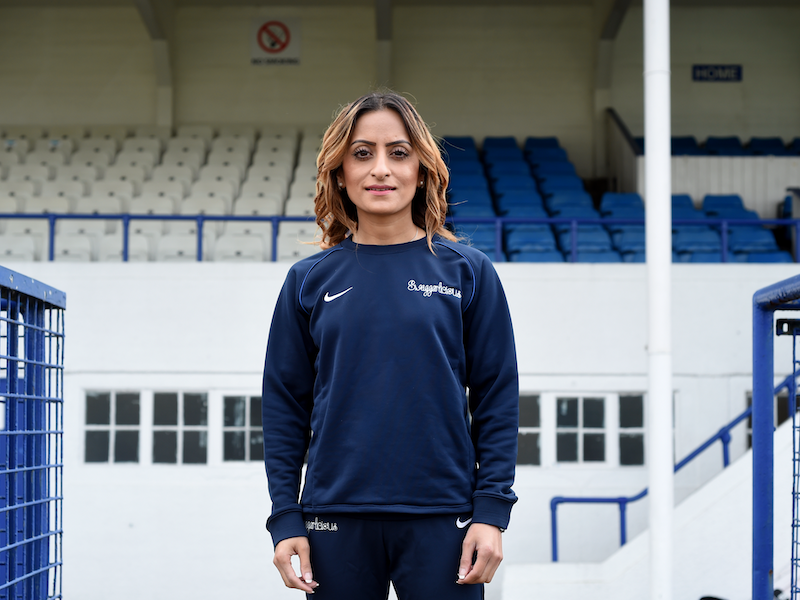Manisha holds a UEFA A Licence qualification and the Advanced Youth Award. A former deputy headteacher, she is the first female of South Asian heritage to become an Assistant Head of Coaching at QPR FC Boys Academy.
Manisha’s books include ’50 Wellbeing Lessons for the Diverse Primary Classroom’ and the critically acclaimed ‘Dream Like Me: South Asian Football Trailblazers’ provide a toolkit for young people to engage in important discussions about Mental Health and Diversity.
Tell me a bit about yourself and your background.
I worked as a primary school teacher in various schools locally for a decade before I pivoted to football coaching.
It was in 2002 when I first began to coach where I set up and ran sessions for pupils at the school where I was a teacher.
Whilst honing my trade as a coach, I spent a lot of time working in grassroots football working with both girls and boys of different age groups. This has been the best learning, teaching me about adaptability.
I also spent a number of seasons in the women’s professional game as Head Coach at Middlesex Girls Centre of Excellence, as well as Centre Manager.
Currently, my role sees me as the first person of South Asian heritage to become an Assistant Head of Coaching at Queens Park Rangers Boys Academy. This is truly humbling and a key driver on wanting to pave the way for others who equally like me, have a football dream.
Outside of my role with QPR, I continue to teach and have partnered with Show Racism the Red Card as well as other charitable organisations, to deliver workshops around Equality, Diversity and Inclusion.
I use my voice actively as well as my position on advisory groups with Sporting Equals, League Coaches Association as well and The FA with the view of creating collective change to diversify the game.
I currently hold both the Advanced Youth Award and A Licence qualifications.
My books include ’50 Wellbeing Lessons for the Diverse Primary Classroom’ and ‘Dream Like Me: South Asian Football Trailblazers’ which provide a toolkit for young people to engage in important discussions about Mental Health and Diversity. Writing and sharing these stories have been some of my most proudest moments.
Why did you choose to coach football?
In 2011 I changed my career from a Deputy Headteacher, to working full-time in football.
I have always had a passion and love for football, inspired by my twin brother.
I have fond memories of playing football with my brother and cousin in the garden. As a South Indian female, growing up in the very early 80s, I didn’t see many girls like me playing football, however, playing football I always felt included and part of a team.
After my twin brother suffered a mental breakdown, it spurred me to look at all options that could help with his recovery. My brother and I had done everything together prior to that. We played football together and watched football together so being passionate about the sport only made me more determined. So I made the brave decision to leave my post and work in a field extremely close to my heart.
What are your greatest strengths and weaknesses as a coach?
I believe it to be the ability to transfer skills as a teacher and strategic educational leadership, into coaching. My coaching philosophy and methodology is deeply rooted in my background in education and teaching ideology. Some may question and debate the differences the role of a ‘teacher’ and a ‘coach’ may have. For me, the fundamental skill set that each brings to the forecourt is transferable. It is the interlocking of these skills that has aided my personal and professional development in the world of football coaching.
I am continuing my growth and learning by working across the development continuum with players transitioning from scholars to the development squad on the cusp of the 1st team. This part of the development phase is certainly an area I would like to gain further knowledge and experience.
What advice would you give when coaching different age groups?
From my experience of what I have learned in being able to coach a 5-year-old to a 25-year-old+, is the importance of understanding how players learn (socially, psychologically, technically and physically) and then being adaptable in your approach to suit the needs and age-group that you are working with. Knowledge and understanding of football alone is not enough – its how this relates to the players that is fundamental.
What’s your leadership style?
I have become more and more curious about Diversity in leadership. I think having greater depth and breadth of experience and perspective allows for a greater ability to relate to others resulting in positive organisational outcomes.
This, along with resilient leadership, certainly resonates with me as a leader and how I lead my team of staff.
A 2017 Zenger Folkman study determined that highly resilient leaders are considered to be more effective by their managers, peers and direct reports. At its core, resilient leadership is the ability to adapt to new circumstances or limitations.
Developing resilient leadership became my focal point in helping me to manage adversity and lead more effectively in adverse situations.
Through the development of resilient leadership, I have gained the confidence to empower action with a greater array of tools that I now use interchangeably.
As a strategic leader, I place high priority on accountability and believe clarity in the role negates confusion on what has been asked and instead provides greater direction for individuals and the overall team.
As a resilient leader, how do you develop resilience in your players?
For me, a resilient learner is one who is able to persevere and stick at something, no matter how challenging the task may be. In football, through persistence and determination, I believe players will increase their practice and learning experience in becoming mentally versatile as well as technically rounded. Creating an environment that allows players to try things without fear of outcome is key to resilient and adaptable learners.
Through enjoyment in football, and players having a direct involvement in the learning process, there will be a positive impact on their development, allowing them to become independent decision-makers.
List three words you would use to describe yourself?
Resilient – Ambitious – Empathetic
What would you tell your younger self?
I would tell my younger self to be persistent and never give up. Adversity in life provides opportunities for growth and allows us to learn and become adaptable. These are important skills that we can use in all walks of life.
What advice would you give to young girls considering a career in coaching?
On embarking upon a career change, I recognised the value and importance of volunteering opportunities and networking. Gaining experience, being open and taking your time to learn your trade is important. You should remain firm in your values and beliefs. However, it is also important to be adaptable to working in varied environments and with different people.
Finding an ally who is going to support your growth and development is also key. Chris Ramsey, QPR’s Technical Director and Head of Coaching has been instrumental in my development as a coach and is certainly an example of a transformational leader who truly believes football is for everyone.
There are far greater opportunities for women and girls now than ever before which is absolutely brilliant. I wish those existed for me when I was growing up.
Organisations such as We Are The City have been immensely helpful in providing a safe space to collaborate with other powerful women across different sectors.
Football is a sport for all and I hope that the pathway for girls and women from all backgrounds continues to be inclusive.
Read more from our inspirational women here.









